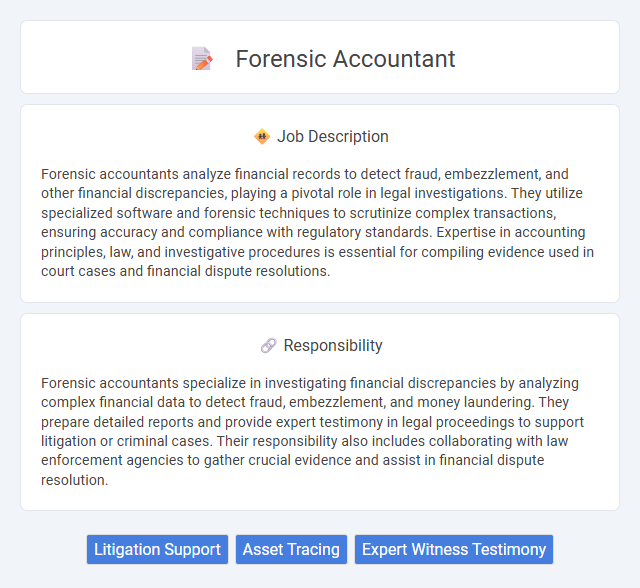
Forensic accountants analyze financial records to detect fraud, embezzlement, and other financial discrepancies, playing a pivotal role in legal investigations. They utilize specialized software and forensic techniques to scrutinize complex transactions, ensuring accuracy and compliance with regulatory standards. Expertise in accounting principles, law, and investigative procedures is essential for compiling evidence used in court cases and financial dispute resolutions.
Individuals with strong analytical skills and a keen eye for detail are likely suitable for a forensic accountant role, as the job demands meticulous examination of financial records. People who enjoy problem-solving and have a high tolerance for complex, often stressful investigations may find this career fulfilling. Those lacking patience or struggling with intensive data analysis might find the job less compatible with their strengths.
Qualification
Forensic accountants typically require a bachelor's degree in accounting, finance, or a related field, with certifications such as Certified Public Accountant (CPA) or Certified Fraud Examiner (CFE) highly valued in the industry. Strong analytical skills, proficiency in accounting software, and a deep understanding of legal standards and financial regulations are essential qualifications. Experience in auditing, investigation techniques, and courtroom testimony further enhances a forensic accountant's ability to uncover financial discrepancies and support legal proceedings.
Responsibility
Forensic accountants specialize in investigating financial discrepancies by analyzing complex financial data to detect fraud, embezzlement, and money laundering. They prepare detailed reports and provide expert testimony in legal proceedings to support litigation or criminal cases. Their responsibility also includes collaborating with law enforcement agencies to gather crucial evidence and assist in financial dispute resolution.
Benefit
Forensic accountants likely provide significant benefits by uncovering financial discrepancies and fraud that might otherwise go undetected, enhancing the integrity of financial records. Their expertise probably supports legal cases and regulatory compliance, thereby reducing the risk of costly penalties and reputational damage. Companies engaging forensic accountants might experience improved trust from stakeholders and greater overall financial transparency.
Challenge
Forensic accounting likely involves complex challenges in uncovering financial discrepancies and fraud through detailed analysis. The role probably requires strong investigative skills to interpret intricate financial data accurately. Professionals in this field may often face high-pressure situations where precision and critical thinking are essential to provide reliable evidence for legal proceedings.
Career Advancement
Forensic accountants specializing in fraud detection and financial investigations can advance to senior analyst or managerial roles by developing expertise in complex data analysis and legal compliance. Obtaining certifications such as Certified Fraud Examiner (CFE) or Certified Public Accountant (CPA) significantly enhances career prospects and access to leadership positions. Experience in courtroom testimony and collaboration with law enforcement agencies further strengthens opportunities for executive roles within financial forensic departments.
Key Terms
Litigation Support
Forensic accountants specializing in litigation support analyze financial data to uncover fraud, quantify damages, and provide expert testimony in legal disputes. They collaborate closely with legal teams to prepare detailed reports and assist in the resolution of complex financial cases. Expertise in forensic accounting techniques, litigation procedures, and regulatory compliance is essential for success in this role.
Asset Tracing
Forensic accountants specializing in asset tracing utilize advanced financial analysis techniques and investigative methods to locate hidden or misappropriated assets across multiple jurisdictions. They examine complex financial records, transaction histories, and digital footprints to uncover fraudulent activities, often collaborating with legal teams and law enforcement agencies. Proficiency in forensic software tools and knowledge of international financial regulations are critical for effective asset recovery and litigation support.
Expert Witness Testimony
Forensic accountants specializing in expert witness testimony provide critical financial analysis and clear, concise reports that aid in legal proceedings. Their expertise includes detecting fraud, quantifying damages, and explaining complex financial information to judges and juries. These professionals apply accounting principles and investigative techniques to support litigation and ensure accurate case outcomes.
 kuljobs.com
kuljobs.com